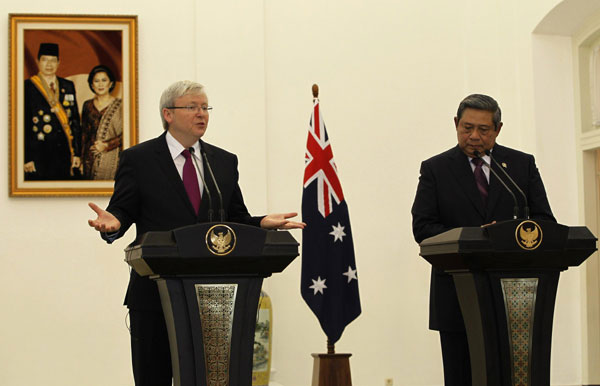Australian PM launches Indonesia country strategy
Updated: 2013-07-05 17:35
(Xinhua)
|
|||||||||||
 |
|
Australia's Prime Minister Kevin Rudd (L) accompanied by Indonesian President Susilo Bambang Yudhoyono speaks to journalist during a news conference after their meeting at the presidential palace in Bogor, West Java July 5, 2013. Rudd is in Indonesia to attend the annual Indonesia-Australia leaders' meeting on Friday. [Photo/Agencies] |
CANBERRA - Visiting Australian Prime Minister Kevin Rudd on Friday launched Towards 2025: Indonesia Country Strategy, part of the Australia in the Asian Century initiative in Indonesia capital Jakarta.
The strategy outlines how Australians can harness and develop the skills needed to deepen and strengthen the engagement with the country's important northern neighbor, Indonesia, a press release issued by the prime minister's office here in Canberra said.
"Indonesia, as a rising regional power with a rapidly growing economy and a consuming class more than double Australia's population, presents significant opportunities for Australia and Australian businesses," the press release said.
Two-way trade in goods and services reached 14.6 billion AU dollars ($13.3 billion) in 2012, making Indonesia Australia's 12th largest trading partner.
It is estimated that more than 400 Australian companies are operating in Indonesia, Australia's "most important near neighbor", in mining, agriculture, finance, health care and transport.
The Indonesia Country Strategy identifies a range of specific pathways to 2025, including updating public perceptions about Indonesia, encouraging Indonesian language and cultural studies, enhancing the mobility of people in both directions, building awareness amongst the business community, and strengthening people- to-people engagement within and between the two governments.
In all, five country strategies will be released, covering Australia's five major relationships in Asia. The strategies for the remaining four, namely China, India, Japan and South Korea, will be released in the coming months.
Related Stories
Australia's former leader Rudd wins Labor caucus ballot 2013-06-26 20:43
Australia missing out on China FTA 2013-06-21 16:31
Australia to develop world's fastest computer 2013-06-21 15:14
Today's Top News
Russia more impatient over Snowden's stay
EU and US set for free trade negotiations
Top judge underlines justice
China and Canada to form pact
China to protect memorial sites for martyrs
No return in economic transition
KMT vets who fought Japanese are saluted
Looted treasures on show
Hot Topics
Lunar probe , China growth forecasts, Emission rules get tougher, China seen through 'colored lens', International board,
Editor's Picks

|

|

|

|

|

|





